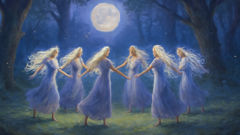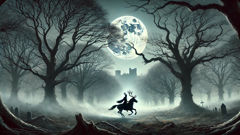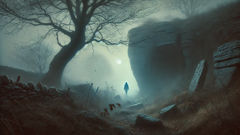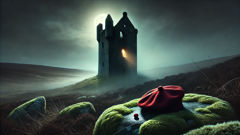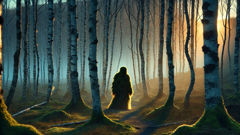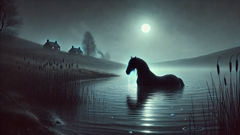Introduction
In the shadowy heart of Romania, where the dense Carpathian forests stretch for miles and the land pulses with ancient memory, whispers of otherworldly beings travel from village to village. Locals speak in hushed tones of the Iele—bewitching female spirits whose beauty is matched only by their power and caprice. On certain nights, when the moon is full and the wind carries the scent of wildflowers, the forest comes alive with melodies both enchanting and unsettling. The Iele are said to emerge then, gliding barefoot across moss and fern, their laughter floating like silver threads through the branches. Their dances form rings that linger in the grass—circles where nothing will grow for years, and where brave or foolish mortals sometimes vanish without a trace. Old shepherds warn their sons never to linger near the groves after dark, for the Iele’s gaze can bring madness, and their song can lure a soul away forever. Yet, for every tale of woe, there are whispers of blessings—of lost travelers guided home, of crops flourishing in fields where the Iele once danced. These legends bind the people to the land, shaping customs and fears, inspiring songs and superstitions. Every Romanian child learns to recognize the soft glow of foxfire, to listen for haunting harmonies in the night air, and to respect the unseen forces that guard the wild places. It is in this realm of moonlight and myth that our story unfolds—a tale woven from the shimmering threads of the old world, where human fate and faerie will entwine beneath the ancient boughs.
Whispers Among the Pines
It was the eve of Sânziene, the summer solstice festival, when the veil between worlds was at its thinnest. In the village of Valea Râului, preparations filled the air: women braided wildflowers into crowns, children chased each other along the dusty paths, and old men gathered by the inn’s fire, trading stories of times when spirits roamed openly. At the edge of the revelry stood Sorin, a young woodcutter’s son, whose restless heart longed for something beyond the rhythm of daily life. He was tall and broad-shouldered, with eyes the color of forest moss and hair as dark as the river’s depths. Though he loved his family and friends, Sorin often slipped away into the woods at dusk, drawn by a music only he seemed to hear.
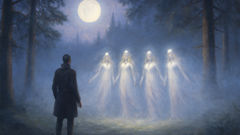
On this night, with the sunset painting the sky in streaks of lavender and gold, Sorin’s footsteps led him deeper than ever before. He moved quietly, pushing aside brambles and ducking beneath low-hanging branches, each step soft upon the leaf-strewn ground. The forest grew denser, the air heavy with anticipation. He paused near a ring of ancient pines, their roots entwined like the hands of old friends. Here, the undergrowth fell away to reveal a clearing—one he had never seen, though he’d roamed these woods all his life.
A strange hush blanketed the glade. The usual chirr of cicadas faded, replaced by a subtle, melodic hum. It seemed to pulse from the very earth, a vibration that tugged at Sorin’s heart. He stood transfixed, watching as mist began to gather, curling around his feet and rising in delicate tendrils. The moon, full and radiant, broke through the clouds, casting silver beams through the canopy. Shadows shifted, coalescing into forms both graceful and wild.
From the mist emerged the Iele. At first, Sorin thought them to be maidens from the village, but as they glided into the moonlight, it was clear they belonged to no earthly tribe. Their hair shone like spun moonbeams, cascading in waves over bare shoulders. Their dresses, woven of dew and spider silk, shimmered with the colors of dawn. Each Iele moved with uncanny grace, her steps barely stirring the grass. Eyes, luminous and deep as forgotten wells, regarded Sorin with an unsettling mix of amusement and curiosity.
They began to dance—slowly at first, arms entwined, voices rising in a wordless song that twined around Sorin’s senses. The music was intoxicating, more felt than heard. It spoke of longing and joy, of heartbreak and hope, of ancient secrets that predated stone and fire. Sorin felt the ground spin beneath him; the air grew thick with enchantment. He tried to turn away, but his feet were rooted to the spot. The Iele beckoned, their laughter as delicate as windchimes, yet edged with something sharper—danger, perhaps, or warning.
Caught in their spell, Sorin watched as the Iele’s dance quickened. Their movements blurred, forming a shimmering ring that pulsed with otherworldly light. The forest around them held its breath. Suddenly, one Iele broke from the circle. She drifted toward Sorin, her eyes shining with ancient wisdom and wildness. She reached out a slender hand, her touch both icy and searing. A thousand images flashed through Sorin’s mind: forgotten rituals, hidden groves, the cycle of life and death. He gasped as the world tilted, and the clearing dissolved into darkness.
When Sorin awoke, he lay at the edge of the village, dew-damp grass clinging to his clothes. The sun was rising, and the sounds of morning—roosters crowing, water drawn from the well—filled the air. He staggered to his feet, memories of the night flickering like candle flames. A faint ring of scorched grass marked his skin, and in his heart a new melody thrummed—one that would haunt him forever.
Curses and Blessings
The days following Sorin’s encounter with the Iele passed in a haze. He wandered the village in a dreamlike state, eyes distant, lips moving as if repeating a secret prayer. His mother grew anxious, pressing cool hands to his fevered brow, whispering charms learned from her own grandmother. The old women of Valea Râului muttered that he must have glimpsed the Fapturi—that his soul hovered in the borderland between this world and the next.
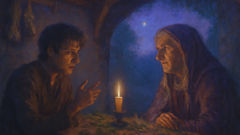
But Sorin spoke little of what he had seen. The memory of the Iele’s dance burned within him, both exquisite and terrible. At night he dreamed of moonlit glades and voices singing in languages older than stone. By day he heard snatches of melody in the wind, felt invisible fingers brush his cheek as he walked the forest paths. Soon, villagers began to notice strange things: a fox crossing Sorin’s path would stop and bow its head; flowers bloomed in his footsteps, only to wither moments later. Children avoided him, sensing something changed.
One evening, desperate for answers, Sorin sought out Baba Veta, the village wise woman. Her cottage stood at the forest’s edge, walls hung with dried herbs and bundles of garlic. Her eyes, sharp as hawk’s, peered at Sorin as he entered. He told her everything—the dance, the touch, the haunting music that would not leave him. Baba Veta listened in silence before stirring a pot of pungent brew.
"You’ve been marked," she said at last. "The Iele do not forget those who see them. Some are cursed, some blessed—few know which until the end. Their gifts are double-edged."
Sorin shivered. "What should I do?"
"You must show respect," Baba Veta replied. "Never speak of them lightly. When you walk the woods, carry wild thyme and St. John’s wort—these may shield you from their ire. If you hear their song, cover your ears. And if you see a ring in the grass, turn away."
But curiosity gnawed at Sorin, stronger than any warning. He began to study the old ways: gathering herbs by moonlight, learning runes and prayers from ancient books. He left offerings at forest crossroads—bread, honey, a silver coin—hoping to appease the Iele. Yet the pull of their music only grew stronger.
As summer waned and the harvest approached, Sorin’s life teetered between worlds. Crops flourished in his father’s fields, but shadows grew deeper in the forest. Once, while gathering wood, Sorin found a girl lost in the undergrowth. She wept with relief as he led her back to the village, but later she whispered to her mother that his eyes glowed in the dusk, and that flowers had sprung from his footprints.
Rumors spread: some said Sorin was blessed by the fae, others that he was cursed. The priest watched him warily; the children kept their distance. Even his friends began to drift away. Sorin felt more alone than ever, yet could not regret what he had witnessed. The memory of the Iele’s dance was both a wound and a wonder—an ache for beauty beyond the reach of mortal hands.
A Night in the Ring
The autumn equinox drew near. The days shortened, and a chill crept through the valley, painting the leaves in copper and gold. By now, Sorin’s connection to the supernatural seemed undeniable. Each night, he felt an inexorable urge to return to the clearing—the place where he had first seen the Iele dance. Against Baba Veta’s warnings and his mother’s pleading tears, he found himself walking the familiar path at dusk, heart pounding with anticipation and dread.
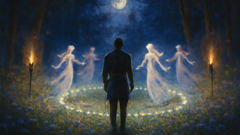
On the eve of the equinox, Sorin could no longer resist. The sky was clear, and a brittle moon hung low above the trees. The air was sharp with the scent of drying leaves and distant woodsmoke. Guided by some inner pull, Sorin made his way through the silent forest. When he reached the clearing, he saw that it was transformed: torches flickered at its edges, illuminating wildflowers that bloomed out of season. In the center, the grass was flattened in a perfect circle—the mark of the Iele’s dance.
As he stepped forward, music rose from the earth itself—strange harmonies that shimmered in the cold night air. The Iele appeared as if conjured by thought alone. They moved with impossible grace, their gowns trailing like morning mist. Their eyes glinted with secrets. They encircled Sorin, their laughter echoing off the trees. One Iele—the same who had touched him before—stepped forward, her voice as clear as mountain water.
"Why do you return?" she asked. "Few mortals dare to cross our path twice."
"I seek understanding," Sorin replied. "Your dance haunts me. I feel caught between worlds—neither fully here nor there."
The Iele exchanged glances. Then, in unison, they sang—a song that wound around Sorin like a living thing. He closed his eyes as visions tumbled through him: memories of ancient forests, sacred springs, joyous celebrations, and catastrophic storms. He saw mortals and spirits living side by side, their fates intertwined by threads of love, envy, and longing. The Iele’s voices spoke of change and constancy, of the need for balance between human ambition and nature’s mystery.
Suddenly the song ceased. Sorin opened his eyes. The circle was empty; only the torches remained. In their place stood a single white flower, gleaming in the moonlight. He knelt and picked it up, feeling a pulse of energy in his palm—a sense of peace that settled deep within him.
From that night on, Sorin’s life changed. His dreams grew clearer, filled with the wisdom of forests and streams. He spoke gently to animals; plants flourished in his care. He became a healer and guide, respected by villagers who once feared him. Yet he never forgot the warning in the Iele’s gaze. He walked carefully between worlds, honoring old customs and sharing what he had learned about respect for nature’s power.
Years passed. Sorin grew into a legend—a man touched by faerie, a bridge between humankind and the mysteries of the wild. Some swore he vanished into the forest each Sânziene night, returning at dawn with dew in his hair and a faraway look in his eyes. Others said he could charm wolves with a whistle or call rain with a song. Whatever the truth, the story of Sorin and the Iele was told for generations: a reminder that beauty and danger walk hand in hand in the shadowed heart of Romania.
Conclusion
The legend of the Iele endures, its echoes still heard in the rustle of leaves and the shimmer of mist above Romanian meadows. Their presence reminds villagers to walk with humility and awe through the wild places, to respect both beauty and danger hidden beneath moonlit branches. Each generation tells anew the story of Sorin—the young man who crossed into mystery, who bore both the burden and blessing of faerie touch. His tale is woven into lullabies sung by mothers at dusk and whispered prayers uttered beneath ancient oaks. Even today, travelers pause at strange rings in the grass, uncertain whether to flee or give thanks. For in Romania’s deep forests, magic lingers where the Iele once danced, inviting mortals to remember that the world’s true heart beats quietly in the twilight between seen and unseen.

